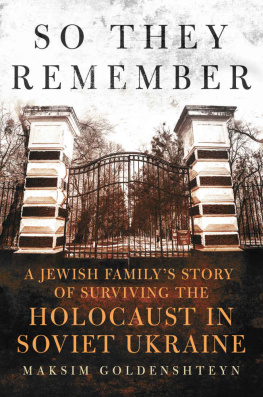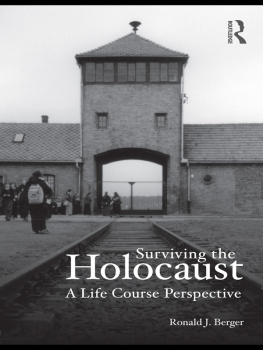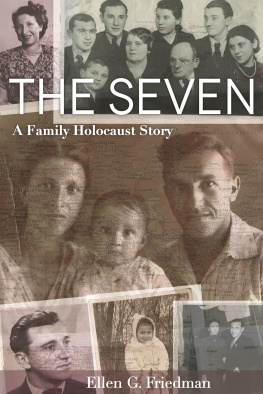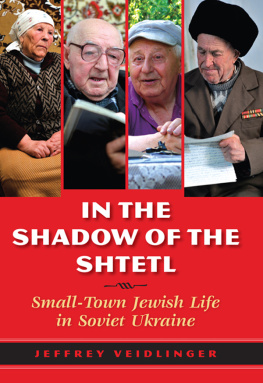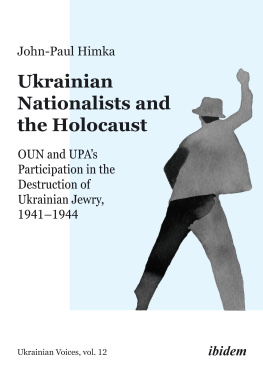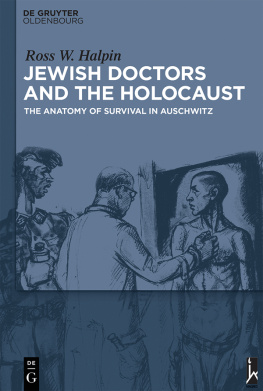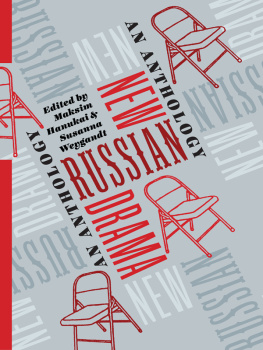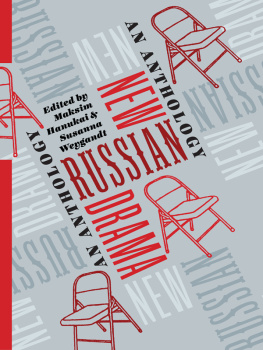Maksim Goldenshteyn - So They Remember: A Jewish Family’s Story of Surviving the Holocaust in Soviet Ukraine
Here you can read online Maksim Goldenshteyn - So They Remember: A Jewish Family’s Story of Surviving the Holocaust in Soviet Ukraine full text of the book (entire story) in english for free. Download pdf and epub, get meaning, cover and reviews about this ebook. year: 2022, publisher: University of Oklahoma Press, genre: Non-fiction. Description of the work, (preface) as well as reviews are available. Best literature library LitArk.com created for fans of good reading and offers a wide selection of genres:
Romance novel
Science fiction
Adventure
Detective
Science
History
Home and family
Prose
Art
Politics
Computer
Non-fiction
Religion
Business
Children
Humor
Choose a favorite category and find really read worthwhile books. Enjoy immersion in the world of imagination, feel the emotions of the characters or learn something new for yourself, make an fascinating discovery.
- Book:So They Remember: A Jewish Family’s Story of Surviving the Holocaust in Soviet Ukraine
- Author:
- Publisher:University of Oklahoma Press
- Genre:
- Year:2022
- Rating:4 / 5
- Favourites:Add to favourites
- Your mark:
- 80
- 1
- 2
- 3
- 4
- 5
So They Remember: A Jewish Family’s Story of Surviving the Holocaust in Soviet Ukraine: summary, description and annotation
We offer to read an annotation, description, summary or preface (depends on what the author of the book "So They Remember: A Jewish Family’s Story of Surviving the Holocaust in Soviet Ukraine" wrote himself). If you haven't found the necessary information about the book — write in the comments, we will try to find it.
Maksim Goldenshteyn: author's other books
Who wrote So They Remember: A Jewish Family’s Story of Surviving the Holocaust in Soviet Ukraine? Find out the surname, the name of the author of the book and a list of all author's works by series.
So They Remember: A Jewish Family’s Story of Surviving the Holocaust in Soviet Ukraine — read online for free the complete book (whole text) full work
Below is the text of the book, divided by pages. System saving the place of the last page read, allows you to conveniently read the book "So They Remember: A Jewish Family’s Story of Surviving the Holocaust in Soviet Ukraine" online for free, without having to search again every time where you left off. Put a bookmark, and you can go to the page where you finished reading at any time.
Font size:
Interval:
Bookmark:
SO THEY REMEMBER
A Jewish Familys Story of Surviving the Holocaust in Soviet Ukraine
Maksim Goldenshteyn
UNIVERSITY OF OKLAHOMA PRESS
NORMAN
University of Oklahoma Press
2800 Venture Drive
Norman, Oklahoma 73069
www.oupress.com
Publication of this book is made possible through the generosity of Edith Kinney Gaylord.
Copyright 2022 by the University of Oklahoma Press, Norman, Publishing Division of the University. Manufactured in the U.S.A.
All rights reserved. No part of this publication may be reproduced, stored in a retrieval system, or transmitted, in any form or by any means, electronic, mechanical, photocopying, recording, or otherwiseexcept as permitted under Section 107 or 108 of the United States Copyright Actwithout the prior permission of the University of Oklahoma Press.
For information about permission to reproduce selections from this book, write to Permissions, University of Oklahoma Press, 2800 Venture Drive, Norman, Oklahoma 73069 or email .
ISBN 978-0-8061-7606-2 (paperback)
ISBN 978-0-8061-9058-7 (ebook : epub)
This eBook was converted from the original source file by a third-party vendor. Readers who notice any formatting, textual, or readability issues are encouraged to contact the publisher at .
To my children
Contents
Acknowledgments
By the time this book is published, nearly a decade will have passed since my maternal grandfather, Motl Braverman, first shared his memories with me. For that, I am forever grateful. I am also indebted to the other Holocaust survivors who have entrusted me with their stories: my maternal grandmother, Anna Braverman, my great-aunts Etel and Luba, my grandmothers cousin Eva Poliak, and my grandfathers good friend Boris Sandler. I also wish to thank Svetlana Voskoboynik for telling me about her late father, Aleksander.
For years, I found all sorts of excuses to delay this project. I am grateful to the small group of family, friends, and colleagues who helped me overcome my self-doubts to see this book to completion. My mother, Svetlana Braverman, has answered hundreds of my questions over the years and was the first to document my grandfathers experiences. From the time we first met, my wife, Megan, has encouraged me to put words to paper. She has supported me throughout this journey. My mother-in-law, Jodi Sanchez, and my former college journalism colleagues and friends William Mari and Allen Wagner have long offered words of encouragement. A special thanks to the cartoonist Amy Kurzweil, whom I first met on a college trip to Israel and who recently published a graphic memoir about her own familys story, Flying Couch, for helping me find a clearer focus.
While writing this book, I had the privilege of speaking to Holocaust survivor Moris Bronshteyn. Moris, now a Bay Area resident, was born in Dzhuryn, Ukraine, a town that plays an important role in this book. Beginning in 1994, Moris conducted video interviews with seventy-four Holocaust survivors in Ukraine, many of them survivors of the Pechera camp, for what is now the USC Shoah Foundations Visual History Archive. In doing so, he helped preserve their stories for generations to come. Moriss video interviews and his book of interview transcripts, Dead Loop, allowed me to add texture to the scenes my grandfather and great-aunt described to me a decade ago.
I am also grateful for the work of the scholars cited throughout the book, people who painstakingly documented a chapter of Holocaust history that has long been overlooked. This includes leading historian Radu Ioanid, who found time to speak with me just as he was transitioning to his new post as Romanias ambassador to Israel. I also wish to acknowledge Rebecca Golbert, who in 2004 authored the first comprehensive study of the Pechera camp, and Jeffrey Veidlinger, whose work documenting the towns and villages of Ukraines Vinnytsia Province has greatly contributed to my understanding of my familys past.
While writing my manuscript, serendipity seemed to strike time and time again. This included a chance introduction, by way of email, to Tulchyn librarian Vladislav Vigurzhinsky, who supplied the photo of Tulchyns School No. 1 that appears in this book. Well into the writing phase, I happened upon an unpublished memoir written by my grandmothers cousin Eva Poliak, which revealed that my familys ties to the village of Pechera were more extensive than I could have imagined.
I was also fortunate to receive assistance from the professional staff and researchers at a variety of institutions, each of whom went out of their way to answer questions, provide access to archival materials, and grant the necessary permissionsall during a global pandemic. These include (in no particular order), the Judaica Department within the Vernadsky National Library of Ukraines Manuscript Institute; Yad Vashem, the United States Holocaust Memorial Museum; USC Shoah Foundation, Leo Baeck Institute; National Museum in Krakw; Jagiellonian Library at Jagiellonian University; and the State Archive of the Russian Federation. I would have been lost without the assistance of the Seattle Public Library system and its indefatigable interlibrary-loan team. I am also indebted to French organization Yahad-In Unum, founded by Holocaust by Bullets author Father Patrick Desbois, which granted me access to photographs from its 2018 trip to Pechera.
Finally, I wish to thank former University of Oklahoma Press editor-in-chief Adam Kane (now the director of Naval Institute Press), who first championed this project. I am grateful for the support of senior acquisitions editor Alessandra Jacobi Tamulevich and senior manuscript editor Stephanie Attia Evans, who along with the wider OU Press team shepherded this book to publication. Copyeditor Richard Feit helped improve the final manuscript in immeasurable ways. I am also grateful to my readers, including fellow OU Press author Barbara Rylko-Bauer, for their incisive feedback. I owe thanks to cartographer Erin Greb for designing the map.
I regret that some of the people mentioned in the preceding paragraphs are no longer with us. There is one other person: my father, Grigoriy Goldenshteyn, who died of ALS in 2019. In his last text message to me, on my thirty-first birthday, he told me he hoped my wishes would come true. In being able to tell this story, they have. I hope that my two young children, to whom this book is dedicated, will gain an appreciation for their heritage and for the people who sacrificed so greatly for themand for me.
A Note on Transliteration and Toponyms
Scholars have used a variety of naming strategies when writing about the villages, towns, cities, regions, and rivers at the center of this book. Some have rendered their names using the Romanian transliteration, others the Russian, Ukrainian, and Polish variants. Occasionally, multiple approaches are used. Throughout this book, I use Ukrainian transliterations to reflect current usage. One obvious benefit is consistency. Another is allowing readers to more easily experience the places in this book (through Google Maps and the vast collections of online photos and videos that can be found for even the smallest, most remote of villages). There is, however, a downside. Many of the survivors I interviewed, or whose testimonies I have used, referenced these places by their Soviet-era Russian names. This was a difficult concession to make, but a necessary one.

Transnistria (Romanian-occupied Soviet Ukraine), 19411944. Map by Erin Greb Cartography.
Prologue
Next pageFont size:
Interval:
Bookmark:
Similar books «So They Remember: A Jewish Family’s Story of Surviving the Holocaust in Soviet Ukraine»
Look at similar books to So They Remember: A Jewish Family’s Story of Surviving the Holocaust in Soviet Ukraine. We have selected literature similar in name and meaning in the hope of providing readers with more options to find new, interesting, not yet read works.
Discussion, reviews of the book So They Remember: A Jewish Family’s Story of Surviving the Holocaust in Soviet Ukraine and just readers' own opinions. Leave your comments, write what you think about the work, its meaning or the main characters. Specify what exactly you liked and what you didn't like, and why you think so.

